
The story was titled "From Hell Is Forged ...A Hero!" I was wondering "what the hell" myself, so at least that's one question sorta-kinda answered. I mean, not only did this nostalgic World War II patriotic throwback arrive too late to cash in on the Bicentennial celebration, but coming after Watergate, he just seemed naively trite. Heck, even "The Six Million Dollar Man" had been cancelled the same month as this first issue's cover-date. Maybe Conway's prior run on Captain America was too brief for his taste, or perhaps Commander Steel was intended to be the first dedicated super-hero of Earth-1? Regardless, he saw cancellation after a scant five issues, based as much on lack of creative merit as the general casualty of all "DC Explosion" titles that were snuffed by economic reality.
As depicted by Gerry Conway and Don Heck, remarkable Princeton biology student Henry "Hank" Heywood visited Munich, Germany, a city and nation he spends four panels venting against. Comparing Nazism to the Black Plague, and rightly disparaging Prime Minister Chamberlain's appeasement policy, Heywood moaned in his journal "God, I wish I'd never let Doctor Giles talk me into coming with him to this German medical conference... Why did we ever bother? The Germans won't even listen to the Doctor's discoveries..." As one, the German doctors decried Giles as a fraud... or actually, as five, their balloons somehow more hateful than Heywood's journal entries. Heywood and Giles exited the auditorium as German professionals pumped their fists and demanded their departure from Der Fatherland.
On their way to the airport, Heywood spied a pair of Brownshirts beating an elderly "Juden pig!" Hank let his own fists do the talking from there: "Forget the old man, Ludwig-- WHY DON'T YOU TRY STARTING WITH ME?" The Jew thanked Hank for his foolish bravery, then pulled a Yinsen, drawing Goosestepper fire while the hothead escaped.
The pair returned to the States in August of 1939, where Doctor Giles was met by his daughter, Hank's horse-faced girlfriend Gloria. The fiery mare presented Hank with a newspaper announcing Hitler's invasion of Poland. "Then that madman's going to spread his hate across Europe... maybe the world! There'll be more old men like that Jew in Munich... Perhaps... millions!" Dr. Giles didn't feel this needed to be America's war, but Heywood's vision of the future compelled him to enlist. "Why I chose the Marines, I'll never know. Maybe because they were the toughest... maybe because of old Victor McLaughlin* movies... or maybe because the young intellectual had something to prove to himself." Gloria Giles neighed heartily at this turn, "Play soldier if you want-- but don't expect me to be waiting when you're finished with your toys!" In her defense, Heywood was quoting scripture at her to validate his decision.
Heywood drowned his sorrows with his boot camp buddies at a local bar, but was gripped by self doubt on the lonely walk back to base. "Maybe Gloria's right. I have been playing this like Gary Cooper playing Sergeant York... Am I kidding myself? Grand-standing-- for my own ego? NO! This is something I believe in!" Just then, Heywood spied Ratzi saboteurs planting dynamite along the base perimeter, and introduced one's face to his knee. Another was dealt a hay maker right into an explosive plunger, blowing the lot of them to kingdom come. Oopsie-doodle.
Investigating troops scraped up what was left of Heywood, who miraculously survived. "Regaining consciousness was like slipping into a vat of boiling oil. Everything hurt so much, I could barely see straight... until I saw Gloria..." The poor thing was in tears over her hurtful parting words, while her father discussed with Hank the pseudo-science the pair specialized in that would make Heywood whole again. "Every day, there were operations... and more operations! Using the bio-retardent[sic] we'd developed together during my years as his student, Giles rebuilt my ravaged body from the skeleton up... First there was steel alloy tubing to replace pulped bone in my arms and legs and ribcage... Then a metal casing to protect my skull... and micro-motors in all my joints to help me move all that steel... Then more substitutions-- an artificial lung for the ruined one... and back-up devices to aid my damaged heart... and finally, most-- most painfully, the bio-retardant was used to induce skin-regrowth over the burned areas... covering the whole patchwork contraption with a flesh that made it my own..." By November on '39, Heywood had gone from invalid to superman. The new lung could sustain Heywood for a half hour underwater, he was super-strong, and nigh impervious. These breakthroughs remained a secret.
"I returned to duty, but with a hitch. Because of my recorded 'medical disability,'
I'd be a desk jockey..." Gloria continued to fume and threaten Heywood; "She hates war-- and so do I. But I'm still going to do my part somehow--" Heywood fashioned a uniform and dubbed himself Steel, The Indestructible Man! "This outfit may be colorful, but it's also far more-- flexible steel alloy, not strong enough to protect an ordinary man from gunfire-- but just tough enough to give me a crucial edge!" Steel then stole weaponry from the Westchester Federal Armory that he could later modify for his own purposes. First though, he happened upon yet another group of Fifth Columnists on his way out. "It's no movie, Nazi-- and I'm no Clark Gable!" Steel chuckled as he brutalized the baddies, going so far as to use the body of one to strike another. "Ever go bowling, friend?"
"Slipping away was easy-- a ten foot leap, and a 50MPH dash into some convenient foliage... Maybe this is why I survived the bomb-blast, to fight rats like the boss of those saboteurs... Baron Death! ...I'm going to use those powers and abilities in my own private war, until America wakes up to the menace of Hitler and Stalin and Tojo and Mussolini. It may be a lonely war, it may be unpopular just now-- but it's got to be done, and I'm the guy cut out to do it!"
Also of note, an interesting article on the anachronistic costumes of 40's retconned characters, including Steel, Baron Blitzkreig, and more.
* Presumably, he meant Victor McLaglen.

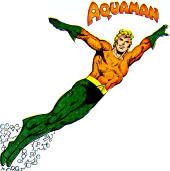
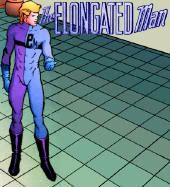
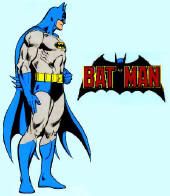
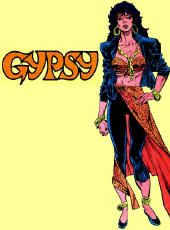

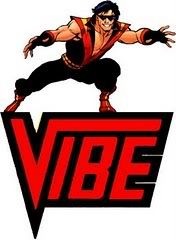
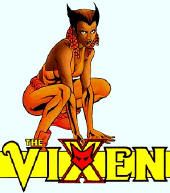

5 comments:
A true classic!
Okay, we may have differing opinions about this one. Heywood's origin is not the most original or compelling backstory for a comic book superhero ever, I will grant you that. Nor are his powers all that amazing (although, the idea of a cyborg/bionic man was still something of a novelty at this point, unlike the post-Terminator era), and his personality never got to really develop all that much in his original run. But I still think the concept worked well enough that had it been introduced outside the trappings of the Explosion/Implosion, it would have run for a few years before the plug was pulled.
By being a desk jockey, Steel was "stuck" in the US of A during the early parts of the war, which immediately differentiates him from Captain America -- fighting spies and gangsters and 5th Columnists and insane America First-ers (see the second issue) is different than punching out mad Nazi scientists and goose steppers. As a rule I tend to enjoy period superheroics, and so this riff on the classic Cap routine is very appealing. And, as you suggest, it really seems to me that this is supposed to take place on Earth-1, and that Steel would be the first "mystery man" operating at this time, as no mention is made of the Justice Society, or anyone else. It wasn't until All-Star Squadron that Steel was established on Earth-2; this "lone warrior" aspect could have been effectively played out as Hank would have no one super-powered allies to rely on.
Conway pretty blatantly intended for this series to allegorically address his feelings about Vietnam (see his letter to the readers in the second issue), which, like The Six Million Dollar Man and the Bi-Centennial, had passed by at this point. So one has to wonder just how long Steel had been sitting on the proverbial shelf in his mind? To me it seems that the main downfall of this series is timing more than anything else.
In any event, I enjoyed this issue, even Baron Death never really caught on. Other baddies, including The Mineral Master and The Gadgeteer, had somewhat better showings, but retained enough goofy charm to fit the retro setting.
Luke, you have the distinction of not only being the first ever person to comment on the Detroit blog, but quite possibly having made the longest single comment of any of my blogs. And that's competing with me! Good show, man!
So you're basically saying that had Steel not debuted as part of the DC Explosion, he would have taken longer to ultimately fail? Such confidence! I think Heywood's personality was actually pretty unique and established succinctly. I wouldn't buy a second issue, but I think I had this guy's number down, which is strong characterization.
The desk jockey bit was a tad too close to Steve Rogers' bungling private bit. The main difference was that Steve was putting on a Clark Kent show to seem ineffectual. Hank was Hank regardless of garb, allowing his medical record to act as his cover. Hank's role makes more sense, but it isn't compelling on its own.
I love period heroes too (see my lengthy post on Chase #6 & Dr. Trap this week,) but a cap should have been set on WWII by 1978. The War years were well covered already by every publisher under the sun, most especially DC.
Had the new book been set in the 1950's instead, with Steel as a Commie smasher, I'd own a set of his series. Heck, if Conway had just retconned something like that into JLDetroit instead of having Hank retire after the war, I'd have still bought it. I like that he's such a blatant Republican, but that isn't enough on it's own to set him apart as anything more than the also-ran cannon fodder he became. Someone needs to write a McCarthy era super-team book into DCU history, and stick Commander Steel in there as team leader. Surely Darwyn Cooke, James Robinson or Howie Chaykin could be conned out of one mini-series along those lines?
Say, why don'cha do a synopsis/review for Steel #2? I've never read it, and it seems like good blog fodder at The Bunker to me.
I've got a follow-up post on Baron Death coming, by the way...
While researching Gerry Conway, I stumbled upon this quote... "Steel was intended to be a tip of the hat to the original Captain America. My favorite Cap stories, when I was growing up, were the ones Stan and Jack set in World War II, so I was just trying to recapture that feeling."
I may not be an optimist, but I try to be a realist. Same goes for Black Lightning, as both series I think had tremendous potential to good "midcard" titles, which sold resonably well even if they never broke out of the middle of the pack.
The Cap-as-a-bumbler elements is true enough, yes, but I thought Cap was actually in a warzone and not back home? Thats what struck me about Heywood being stuck behind a desk in Long Island, that it gave him the opportunity to punch out sabotuers and whatnot on the homefront, while Cap was off galavanting through Europe hitting people. Admittedly I have not read much wartime-era Cap.
Earth-1, Earth-2? I have to go with Earth-1, as there is no mention anywhere of the Justice Society. The stories would eventually be revealed as having taken place on Earth-2 thanks to Roy Thomas, but I hold to be self-evident that our man Heywood was busting skulls on Earth-1 before he got the axe, dammit.
Black Lightning... Vixen... A J'onn J'onzz feature... damn you DC Explosion! Such potential laid waste by one lousy winter and too much Conway/Kirby/Ditko flotsam!
You're right about Cap's wartime adventurers-- it's just that you still had the contrast between Pvt. Rogers never seeing much action, pulling KP and whatnot, while Cap was in the thick of it. From my reading of #1, Heywood was stuck on administrative duty, which wouldn't mean he couldn't have gone overseas, just that he'd be in an office once over there. I figured the early homefront adventures were due to the series starting before U.S. involvement in the war, with an inevitable transition as time passed.
My other problem is that fighting Fifth Columnists and gangsters was already old hat by the time Captain America was created, which is why his socking Hitler on the cover of his first issue was such a sensation. A twist was needed, and may well have come in the form of Earth-1 status. I might have settled for his being the first super-hero to acknowledge post-war to have beat up Japanese people. Didn't appear to be going that way, though...
Post a Comment